Archive for September 14th, 2010
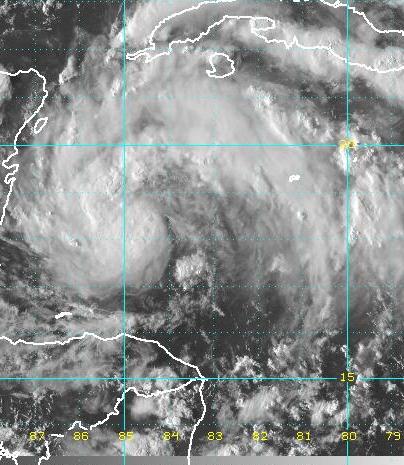
Cayman Islands escapes Tropical Storm Karl
 (CNS): The area of low pressure which passed over the Cayman Islands today, turned into the eleventh named storm of the season today, when the centre was around 196 miles south west of Grand Cayman. Although Cayman has escaped the worst of the weather as Karl is now moving west-northwest and away from the Caymanarea at 15 mph hazard but some further strengthening of Karl is expected overnight which will lead to continued cloudy to overcast skies with locally heavy showers and squally conditions occurring at times throughout the night. Flooding of low lying areas is expected, and residents of these areas should take all necessary precautions.
(CNS): The area of low pressure which passed over the Cayman Islands today, turned into the eleventh named storm of the season today, when the centre was around 196 miles south west of Grand Cayman. Although Cayman has escaped the worst of the weather as Karl is now moving west-northwest and away from the Caymanarea at 15 mph hazard but some further strengthening of Karl is expected overnight which will lead to continued cloudy to overcast skies with locally heavy showers and squally conditions occurring at times throughout the night. Flooding of low lying areas is expected, and residents of these areas should take all necessary precautions.
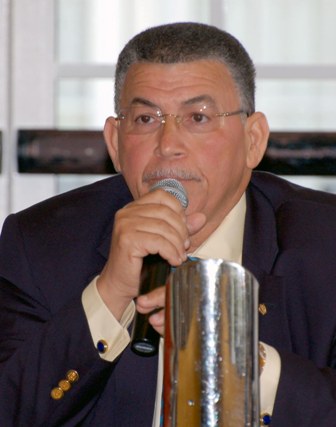
Sudden cancellation of premier’s address to country
 (CNS): Just four days after it was announced that tonight (Tuesday 14 September) the premier would make a national radio and television address to the country on the economy, his press officer has said that this is postponed. While no explanation for the delay or any new date set for the broadcast has been given, the premier’s office says that the question and answer town hall meeting at the George Town Town Hall will still take place at 8pm Wednesday, 15 September, as announced. The premier’s message was to be carried on Radio Cayman and Cayman27 this evening, and it was announced last week that he planned to speak to the people of the Cayman Islands about some of his government’s economic policy.
(CNS): Just four days after it was announced that tonight (Tuesday 14 September) the premier would make a national radio and television address to the country on the economy, his press officer has said that this is postponed. While no explanation for the delay or any new date set for the broadcast has been given, the premier’s office says that the question and answer town hall meeting at the George Town Town Hall will still take place at 8pm Wednesday, 15 September, as announced. The premier’s message was to be carried on Radio Cayman and Cayman27 this evening, and it was announced last week that he planned to speak to the people of the Cayman Islands about some of his government’s economic policy.
The message was going to give an overview of the government’s strategy to deal with the current economic situation across all sectors of the Cayman economy.
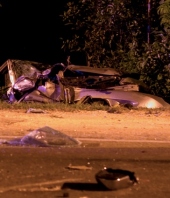
Teen driver charged in fatal collision
 (CNS): Update — An 18-year-old woman has been charged with driving under the influence of alcohol and causing death by dangerous driving. Brooke Novak appeared in court today in connection with a fatal road crash last month. At about 12.30am on Tuesday, 3 August, police received a report of a two vehicle collision on the Esterley Tibbetts bypass near Lakeside Condos. Fedaranne Faustino, a 24-year-old passenger in a Honda Civic, sustained serious injuries and later died at the Cayman Islands Hospital. Novak who was driving a Toyota Land Cruiser, was arrested at the scene. (Photo by Dennie Warren Jr)
(CNS): Update — An 18-year-old woman has been charged with driving under the influence of alcohol and causing death by dangerous driving. Brooke Novak appeared in court today in connection with a fatal road crash last month. At about 12.30am on Tuesday, 3 August, police received a report of a two vehicle collision on the Esterley Tibbetts bypass near Lakeside Condos. Fedaranne Faustino, a 24-year-old passenger in a Honda Civic, sustained serious injuries and later died at the Cayman Islands Hospital. Novak who was driving a Toyota Land Cruiser, was arrested at the scene. (Photo by Dennie Warren Jr)
It was determined that the driver of the Honda was not driving under the influence of alcohol, having passed all relevant screening tests for DUI, police announced a few days after the crash.
Yesterday, Monday 13 September, the 18-year-old Novak was formally charged in connection with the incident. She was charged with driving under the influence of alcohol and causing death by dangerous driving.
The young woman was given bail, but her passport has been seized and the court has prevented her from leaving the country to attend college. Novak, who is a Canadian passport holder, is facing serious charges and the court heard that she was considered too much of a flight risk for her to be allowed to leave.
Represented by defence attorney John Furness, she is expected to appear in court again later this month.
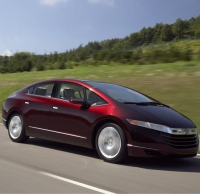
World’s first hydrogen-powered production car
 (BBC): A fuel cell car claimed to be the world’s first to come off a production line has come to the UK. The Honda FCXClarity uses hydrogen to generate electricity, which then powers the car. The carmaker sees it as the future of motoring, insisting hydrogen is better than batteries that need to be very heavy to supply enough electricity. But it is likely to be many years before the infrastructure is in place to make these cars practical. As such, Honda’s hydrogen car could be seen as a brave move; previous models made by other carmakers in the past, often as derivatives of conventinoal models, have not been put into production.
(BBC): A fuel cell car claimed to be the world’s first to come off a production line has come to the UK. The Honda FCXClarity uses hydrogen to generate electricity, which then powers the car. The carmaker sees it as the future of motoring, insisting hydrogen is better than batteries that need to be very heavy to supply enough electricity. But it is likely to be many years before the infrastructure is in place to make these cars practical. As such, Honda’s hydrogen car could be seen as a brave move; previous models made by other carmakers in the past, often as derivatives of conventinoal models, have not been put into production.
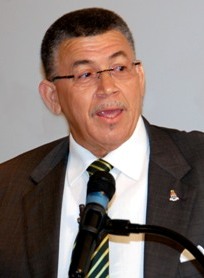
Mac says people must give something to get something
 (CNS): The country’s premier has said that people need to make sacrifices in order for the country to improve its economic fortunes. Speaking to tourism stakeholders last week at an industry lunch, McKeeva Bush berated the community when he said everybody wanted something but no one was prepared to give anything. He said some people didn’t recognise the importance of the cruise industry but it was very important and government was focusing on the need to turn cruise visitors into overnight guests. He said the cruise project was essential and if “we are going to have to lift some piece of coral out of the way” then that’s what would happen. “To get something we have to give something,” Bush said.
(CNS): The country’s premier has said that people need to make sacrifices in order for the country to improve its economic fortunes. Speaking to tourism stakeholders last week at an industry lunch, McKeeva Bush berated the community when he said everybody wanted something but no one was prepared to give anything. He said some people didn’t recognise the importance of the cruise industry but it was very important and government was focusing on the need to turn cruise visitors into overnight guests. He said the cruise project was essential and if “we are going to have to lift some piece of coral out of the way” then that’s what would happen. “To get something we have to give something,” Bush said.
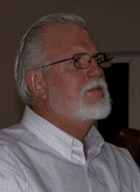
Law aims to protect kids
 (CNS): Although the new Domestic Violence bill, which has gained support from both government and opposition, was driven by the issue of gender violence in the country, the minister responsible said it would also protect the islands’ children. Presenting the new law to his legislative colleagues last week, Mike Adam said many of society’s current problems were down to children growing up witnessing or experiencing violence and abuse in the home. He said these kids learned no other way of dealing with conflict but through violence and the goal of the legislation was to eradicate abuse from the domestic setting and protect the children as well as other family members from it. (Photo Dennie Warren Jr)
(CNS): Although the new Domestic Violence bill, which has gained support from both government and opposition, was driven by the issue of gender violence in the country, the minister responsible said it would also protect the islands’ children. Presenting the new law to his legislative colleagues last week, Mike Adam said many of society’s current problems were down to children growing up witnessing or experiencing violence and abuse in the home. He said these kids learned no other way of dealing with conflict but through violence and the goal of the legislation was to eradicate abuse from the domestic setting and protect the children as well as other family members from it. (Photo Dennie Warren Jr)
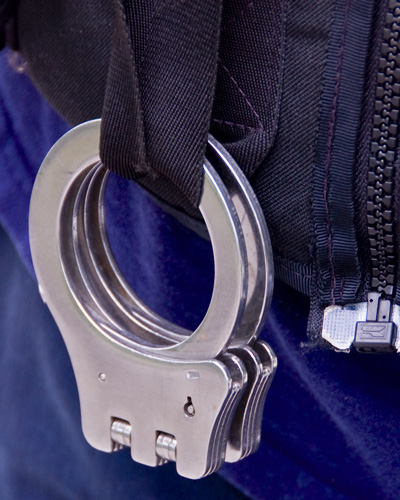
Right to silence lost
 (CNS): The long held right for someone who is arrested to remain silent without incriminating themselves has been lost. Although serious concerns have been raised in the community, the controversial Police Bill, which includes the change, is shortly to become law. In future, remaining silent or speaking can all be used against an individual who falls foul of law enforcement and is arrested .The attorney general defended the clause which will enable prosecutors to point a jury (at trial) towards an adverse inference or a negative reason for a person’s silence at arrest, saying it was not new and had been in place in the UK since 1994. (Photo Dennie Warren Jr)
(CNS): The long held right for someone who is arrested to remain silent without incriminating themselves has been lost. Although serious concerns have been raised in the community, the controversial Police Bill, which includes the change, is shortly to become law. In future, remaining silent or speaking can all be used against an individual who falls foul of law enforcement and is arrested .The attorney general defended the clause which will enable prosecutors to point a jury (at trial) towards an adverse inference or a negative reason for a person’s silence at arrest, saying it was not new and had been in place in the UK since 1994. (Photo Dennie Warren Jr)
He said that not only had his views not changed but, given the attitude of the current government to legal aid, his concerns are greater now than were 9 years ago.
He said the change in the law would lead to serious consequences, which havebeen highlighted by a number of legal experts. The former cabinet minister also pointed out that, while the UK has had similar provisions operating for the past decade and a half, there are significant practical obstacles to introducing the adverse inferences provisions to Cayman law.
“Firstly, legal aid is not available to suspects until they are charged and taken to court. Therefore persons arrested, detained or interviewed at the police station may have adverse inferences drawn from their failure to answer questions without having had the benefit of independent legal advice as to the consequences of remaining silent,” he said, agreeing with the criminal defence bar but going further when he pointed out the attitude of the current government to legal aid.
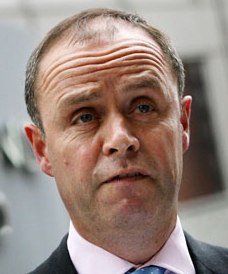
Former OT minister suing Operation Tempura boss
 (CNS): According to the UK’s Guardian newspaper, a lawsuit alleging a police cover-up of phone hacking has been launched by one of Scotland Yard’s former senior officers and the former UK minister with responsibility for Overseas Territories, Chris Bryant. The claim for judicial review filed Monday accuses Assistant Metropolitan Police Commissioner John Yates, the man who had oversight of the discredited Operation Tempura and the special police investigation team (SPIT) here in Cayman, of making misleading statements to parliament and the public and of failing to carry out a proper investigation.
(CNS): According to the UK’s Guardian newspaper, a lawsuit alleging a police cover-up of phone hacking has been launched by one of Scotland Yard’s former senior officers and the former UK minister with responsibility for Overseas Territories, Chris Bryant. The claim for judicial review filed Monday accuses Assistant Metropolitan Police Commissioner John Yates, the man who had oversight of the discredited Operation Tempura and the special police investigation team (SPIT) here in Cayman, of making misleading statements to parliament and the public and of failing to carry out a proper investigation.
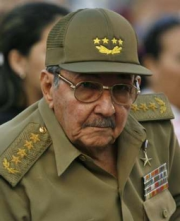
Cuba’s public-sector layoffs signal major shift
 (New York Times): In perhaps the clearest sign yet that economic change is gathering pace in Cuba, the government plans to lay off more than half a million people from the public sector in the expectation that they will move into private businesses. Over the past several months, President Raúl Castro has given stern warnings that Cuba’s economy needs a radical overhaul, beginning with its workers. With as many as one million excess employees on the state payroll, Mr. Castro has said, the government is supporting a bloated bureaucracy that has sapped motivation and long sheltered a huge swath of the nation’s workers. “We have to erase forever the notion that Cuba is the only country in the world where one can live without working,” he told the National Assembly last month.
(New York Times): In perhaps the clearest sign yet that economic change is gathering pace in Cuba, the government plans to lay off more than half a million people from the public sector in the expectation that they will move into private businesses. Over the past several months, President Raúl Castro has given stern warnings that Cuba’s economy needs a radical overhaul, beginning with its workers. With as many as one million excess employees on the state payroll, Mr. Castro has said, the government is supporting a bloated bureaucracy that has sapped motivation and long sheltered a huge swath of the nation’s workers. “We have to erase forever the notion that Cuba is the only country in the world where one can live without working,” he told the National Assembly last month.

Swiss cities consider allowing foreign residents to vote
(Swiss info): Foreigners living in French-speaking Switzerland are able to take part in votes and elections in their commune and sometimes also at the cantonal level. In the German-speaking part of the country, this is largely only possible once Swiss citizenship has been obtained. On September 26, Bern and Basel will decide on whether to follow the Swiss-French lead and allow foreigners the vote. With the exception of Valais, all the western Swiss cantons have introduced voting rights for foreigners. Neuchâtel and Jura accorded foreigners voting rights from the time of their creation, in 1848 and 1978 respectively.